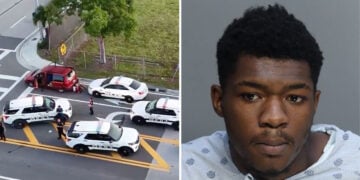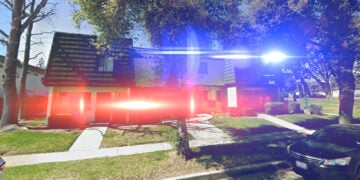Congratulations, as a righteous, law-abiding gun owner, you have several handguns that you legally own in your state and must sell one privately. But by privately selling your gun, will you contribute to a mass murder massacre?
A Typical Private Gun-Sale Situation
You decide that you urgently need to privately sell your handgun to buy food for your kids. You are not in the business of regularly selling firearms and are not a federally-licensed firearms (FFL) dealer. Your friend introduced you to his friend’s friend from an adjoining state that wants to buy your gun. You met him socially three times. Although the friend-of-a-friend-of-a-friend seems pleasant, peaceful, innocent enough, and not dangerous, you wonder about selling your handgun to someone you do not know that well. You don’t personally know his background and are not certain one way or the other if he would properly use the gun and is mentally stable, without any felony convictions
Your state does not have a Red Flag Law with Risk Protection Orders, but his adjoining state does. You wonder “Does he have a Risk Protection Order against him in his Red Flag state? Should I seek any derogatory information, like felony and domestic abuse convictions and mental health issues?” You know by federal law that certain individuals are prohibited from owning guns. It seems many states and elected officials are being driven to focus on Red Flag laws, and you don’t want to be a test case.
But, you need to sell the gun quickly and definitely want to make sure that you conduct the private handgun sale legally, properly, and take no chances for violating any law. So what do you do? Hopefully, the following information will help you in making a decision. But remember your state regulations and laws have a definite role in your considerations, the requirements, and your particular decision.
Well, you know that the Second Amendment to our U.S. Constitution grants us the right as private citizens to keep and bear arms. There are, however, legal regulations and limitations on how we sell and possess firearms. For example, FFL dealers are required by federal law to conduct background checks on all prospective gun buyers.
Optional State Background Checks
States have the option, per federal law, of serving as a state “point of contact” to conduct their own background checks using state, as well as federal records and databases, OR having the checks done by the FBI using the federal National Instant Criminal Background Check System (NICS) database. And there are federal gun laws established under the Brady Handgun Violence Protection Act that prohibit gun ownership by certain individuals, such as mentally-ill individuals and those under protective orders for domestic violence.
Some states reiterate the federal requirement and do not have their separate state background checks by choice. Currently, three states require a state-issued Permit for private sales of ALL firearms.
- Hawaii
- Massachusetts
- Illinois
Four states require a state-issued Permit for private sales of handguns only. In 2019, twenty-two states and the District of Columbia regulate private, unlicensed sellers of all firearms (including handguns) by requiring background checks to be conducted for private sales or a state-issued permit prior to sale… while other states do not require them for private sales, per Wikipedia.
States/District Requiring Background Checks or Advanced Permits* for Private Sales of Firearms (22)
- California
- Colorado
- Connecticut
- Delaware
- District of Columbia
- New York
- New Jersey
- Nevada
- New Mexico
- Washington
- Oregon
- Rhode Island
- Vermont
- Maryland
- Pennsylvania
- Hawaii*
- Illinois*
- Massachusetts*
- Iowa*
- Michigan*
- Nebraska*
- North Carolina*
Florida Background Check – Example
My state of Florida, for example, is a point of contact state for the NICS check. So before a handgun or firearm sale, dealers in Florida must initiate the background check required by federal law and contact the Florida Department of Law Enforcement (FDLE.) Dealers call the FDLE and request a check of information in the Florida Crime Information Center and the National Crime Information Center database systems as of the date of the request. Dealers receive and record an FDLE approval number, as appropriate. FDLE is required to review any available records to determine if the buyer is prohibited from purchasing a firearm due to a felony conviction, a misdemeanor domestic violence crime conviction, or being adjudicated mentally defective or committed to a mental institution by a court. Florida law does not require private sellers who are not licensed dealers to initiate a background check when transferring a firearm.
Alabama Background Check – Example
As compared to Florida, the neighboring state of Alabama is NOT a point of contact state for the NICS check. Alabama law reiterates the federal requirement that firearms dealers must initiate NICS background checks for buyers or transferees prior to the sale. So in Alabama, dealers must initiate required background checks by contacting the FBI directly. Licensed handgun dealers in Alabama are required to view a buyer’s identification before transferring a handgun. All information from any state or local government agency which is necessary to complete a NICS check must be provided to the Criminal Justice Information Center. Alabama does not require private sellers who are not licensed dealers to initiate a background check when transferring a firearm.
Risk Protection Orders or “Red Flag” Laws
Risk Protection, Extreme Risk Protection, or “Red Flag” laws and orders authorize law enforcement agencies and/or family members to petition a court for a civil order preventing a “dangerous” person from accessing firearms for up to one year. Individuals can initiate the request and in some states, just about anyone can do so. Determining and supporting who is a “dangerous” person is very subjective, but there are some objective criteria. Red Flag laws vary by state, so check the details for your state. The Order is required by most states to be entered within 24 hours from issue into state Crime Information Center and the National Crime Information Center databases for enforcement with background checks.
Will Risk Protection Orders Work to Prevent Dangerous Persons from Using Firearms?
There seems to be a movement to preemptively confiscate firearms if an individual is deemed a dangerous threat, using these Red Flag laws and Risk Protection Orders. It is my general understanding that even President Trump seems to generally endorse the basic concept at this time, with some limitations, but more to follow. Recognize that different states, jurisdictions, judges, law enforcement officers, and government employees identify issues, interpret, apply, and enforce laws and solutions differently. So this lack of uniformity may be a detriment to effectively resolving responses to dangerous threats and individuals.
But, are these laws and orders the magical and universal panacea to stop homicidal maniacs from destroying our country? Theoretically, the court order is issued, and law enforcement officers come to the residence and confiscate all the guns of the individual who is deemed a threat to him/herself and others. One of the problems is how do the police know they got all the guns from the residence? The dangerous maniac may have hidden some around the residence. Maybe they have some stored offsite in a storage locker or at a friend’s residence. What about at another home or lake cabin?
Or someone can sell them a gun, and the seller does not know about the Red Flag Order. You could have sold a handgun to a violent murderer and not even have known it, but this could also happen through a licensed dealer. Criminals break the law frequently, so they may not reveal all their background and guns to the police and get away with hiding one. Or they may simply get one from another criminal or on the black market.
NOTE: Red Flag laws and Risk Protection Orders are not a solution or even a significant part of a solution to the mass shooting problems and murders by dangerous maniacs. Laws and more laws and court orders and the gun itself as a tool are NOT optimal nor long-term solutions. Rather focusing on the deranged individual, identifying and predicting deviant and violent behaviors, and swiftly taking related positive actions are significant.
Currently 17 States with “Red Flag” Laws
At this time in 2019, approximately seventeen states and the District of Columbia have implemented these orders and laws to authorize law enforcement to seek a court order to prevent firearms access. States with these “Red Flag” laws include:
- California
- New York
- New Jersey
- Massachusetts
- Maryland
- Washington
- Oregon
- Colorado
- Hawaii
- Illinois
- Indiana
- Connecticut
- Delaware
- Vermont
- Rhode Island
- Nevada
- Florida
- District of Columbia
Risk Protection Orders and FBI NICS Databases
Interestingly, because these Risk Protection Orders and laws do not involve federal prohibitions [18 U.S. Code 922 (g)], they are not submitted to and contained within the FBI NICS databases, unless specified by law.
My state of Florida enacted Florida Statute 790.401, an extreme Risk Protection Order law in 2018. These type of laws (“Red Flag” laws) were first enacted in California. In Florida, the petition to the court for a Risk Protection Order must state that the “respondent poses a significant danger of causing personal injury to himself or herself or others by having a firearm or any ammunition in his or her custody or control or by purchasing, possessing, or receiving a firearm or any ammunition, and must be accompanied by an affidavit made under oath stating the specific statements, actions, or facts that give rise to a reasonable fear of significant dangerous acts by the respondent.” The Order in Florida must identify the quantities, types, and locations of all firearms and ammunition the petitioner believes to be in the respondent’s current ownership, possession, custody, or control.
Guilty Until Proven Innocent?
Sadly, usually the first time a gun owner becomes aware of the confiscation of his or her guns is when the police knock on the door with a court order authorizing collection of the guns. Although it varies by state, a targeted gun owner may appeal and appear at a hearing only AFTER the guns are taken, to argue why the guns should be returned. It seems that there is much room for abuse of these well-intentioned laws by a disgruntled ex-spouse, upset girlfriend or boyfriend, mad employee, or some anti-gunner wanting attention and a legal battle.
Does a judge have the time, medical and technical expertise, and available resources to investigate and to decide if the court order is proper and should be granted? Do we accept at face value the signature by the individual on the affidavit attesting to their fear of possible dangerous acts? Do we, should we, or can we legitimately suspend or revoke the Second Amendment rights in our Constitution of an individual? What is the relationship between “Due Process” and Risk Protection Orders? Should the gun owner have an immediate opportunity to contest the order for giving up his or her guns?
Have Recent Risk Protection Orders Stopped the Murders?
Recent terrible murders in Dayton, Ohio, and Parkland, Florida highlight walking Red-Flag individuals who had access to firearms, but yet the terrible murders happened, given existing Risk Protection Order or similar options. They murdered many innocent adults and children and were not stopped by existing laws and orders. But the El Paso, Texas murderer had no apparent criminal record or history of mental illness and his murderous rampage was not predicted in advance, making an Order useless. He did write a hate-filled manifesto and showed a gun just before the shootings.
Do we really need more laws and more orders? Can we corral all possible motivations and tools that can be used as weapons by viciously-motivated individuals, e.g., the murderer reasons “take my gun so then I’ll use a screwdriver or bomb instead?” Can we stop those monsters who are intent on getting a weapon surreptitiously from someplace or someone, or on using an alternative tool, like a hammer, dinner knife, broken beer bottle, or baseball bat to kill others?
Patterns of Violent and Abhorrent Behaviors Might Be Predicted
Some unverified reports indicate that the Parkland, FL murderer was coddled by a school district that did not sufficiently deal with nor report certain evident violent crimes, despicable behaviors, and unacceptable dangerous tendencies. The murderer’s violent behaviors seemed well known, and some unsubstantiated reports indicate that teachers even had a backup plan in case he became threatening. It seems he beat his adoptive mother, sent death threats to fellow students, and put a gun to another person’s head, per some emotional and perhaps unreliable individuals. He was even searched every morning after arriving at school, some say.
So would a Risk Protective Order even help prevent the terrible events? Perhaps, we did not need laws to get this murderer before he committed his terrible crimes. Unsubstantiated reports indicate that if the Sheriff there had taken certain actions, he would not have been able to legally purchase the rifle for his evil acts. Initial subjective indications suggest that the Dayton murderer could have been adjudicated mentally unfit which would have barred him from legal purchase and possession of the firearm for his evil. More facts needed, but something to think about. Recent reports indicate that the El Paso and Dayton shooters had expressed strong violent extremist comments on the Internet and in social media, before their murders. Surely indicators of what might, and did, violently occur.
NOTE: Expressed violent comments, hatred, and disciplinary behaviors need to be quickly, adequately, and professionally analyzed and dealt with in a preventative manner, rather than focusing on more laws and regulations, before shootings occur.
Protecting Due Process and Second Amendment Rights
To my knowledge, none of the Red Flag laws provide for criminal penalties for making a false statement in support of a petition for an Order. Also, I am not aware of any provisions for a periodic judicial review of the Order to determine if the individual remains an imminent threat or risk to themselves or others. To me, these considerations are vital in protecting the Second Amendment and Due Process rights of Americans.
The Fallacy of the Gun Show “Loophole”
Should you be free to legally pass your guns down to your family members and sell them to your friends? Should you have to have a license and pay fees and taxes to be able to do this? Some think you should not be able to do this and demand closing of the gun show “loophole.” But, is there really a gun show “loophole?” Should and to what extent are unlicensed dealers allowed to sell guns at gun shows?
I have attended many gun shows over my almost 50 years as a handgun aficionado, and I believe that at least 80 to 90 percent of the vendors are licensed dealers. But, most do not sell guns, but rather sell accessories like holsters, belts, lasers, lights, safety glasses and equipment, magazines, books, shot timers, trigger pull gauges, etc. Of course, if you are a licensed firearms dealer, you are allowed to sell at gun shows in your own state. And all the laws apply, like running a mandatory federal background check through the FBI’s NICS system.
The Federal Bureau of Alcohol, Tobacco, Firearms, and Explosives’ website lists FFL licensed dealers by state:
https://www.atf.gov/firearms/listing-federal-firearms-licensees-ffls-2017
Occasional Sale of Firearms from Personal Collection
Now by current federal law, a background check and other regulations do not apply if you are an individual that wishes to occasionally sell a firearm from your personal collection in a private legal transaction. So, Sammy, the Slimeball Gun Runner is not included, and background checks are required by him. Sure, the checks will happen because there is a law? Current law strictly defines this. If an individual is “engaged in the business” of selling firearms, they must be licensed. This is defined as, “a person who devotes time, attention and labor to dealing in firearms as a regular course of trade or business with the principal objective of livelihood and profit through the repetitive purchase and resale of firearms.”
Do Criminals Mostly Purchase their Guns at Gun Shows?
I have learned that many gun show promoters require that all vendors leasing space at a show, including private parties, must agree to run background checks, regardless of whether they hold federal licenses or not. My experiences tell me, and I believe that almost all or at least the very large majority of guns sold at gun shows go through federal background checks. Again, in several states, there is another layer of regulation as some states require background checks as part of all private firearms transactions. Background checks in some form for at least some private sales are required in about 22 states and Washington, D.C. Will dangerous criminals go through the steps, requirements, and costs to buy their guns at gun shows? They will probably steal them or get them on the underground black market. Here is some strong, supporting data from a 2019 survey of prisoners with guns.

According to a January 2019 U.S. Department of Justice survey by Dr. M. Alper and L. Glaze, of 287,400 federal and state prison inmates:
- less than one percent (0.8) of criminals that possessed a firearm during their current offense acquired their guns from gun shows;
- among prisoners who possessed a gun during a crime, 90% did not obtain it from a retail source;
- only 1.9% of prisoners obtained a gun from a retail source;
- nearly 50 percent of prisoners reported acquiring their guns illegally, such as by theft or on the underground black market;
- about 56% of prisoners who possessed a gun during their crime had either stolen it, obtained it from the crime scene, or obtained it off the street, or from the underground market;
- about 43% of criminals obtained their gun from the underground market; and
- among state prisoners who possessed a gun during their crime, 27% killed someone with it.
Conclusions
It seems to this author that almost everyone wants to save lives, prevent violent criminal, terrorist, and murderous acts, and stop dangerous mentally-unstable individuals from getting guns and carrying out terrible evil acts. But, do we need to sacrifice the Second Amendment right of individuals to defend themselves?
There are already existing federal and state laws that strictly govern sales of guns, both commercially and privately. Though not universally required in all states for all types of sales and transfers, and while differently structured by state, background checks are being done for commercial and private transactions. Most criminals, about 0.8 percent, do not acquire their guns used in crimes from gun shows, according to a recent study. Most criminals steal their guns used in crimes or get them from the underground market.
Are more laws and regulations really needed or instead do we need to focus on the existing laws and identifying and handling individual expectations, motivations, and abhorrent behaviors before a murderous act occurs? Will a dangerous murderer with a violent mindset actually resort to buying a gun thru a licensed dealer, or from the general public’s law-abiding, everyday citizen.
You are probably safe selling your handgun in a private sale to your friend. But, it depends on the states of residence for the buyer and seller and existing state laws. Probably, the dangerous murderer will most likely get their gun from the dregs of the streets, gun traffickers, or from others in the illegal criminal black market.
Focusing on identifying and quickly dealing with the individual and mental health indicators, motivational characteristics, and already demonstrated violent tendencies and acts, rather than the tool of destruction, will pay more dividends for reducing crime and not allowing guns to get into the hands of illegal buyers, gun traffickers, and violent murderers. We must be open-minded about considering all viable alternative solutions. We must work together to quickly handle this revolting dilemma before it consumes our American way of life and ourselves.
Continued Succes and Persevere!
Image by Author.
* This personal opinion article is meant for general information & educational purposes only and the author strongly recommends that you seek counsel from an attorney for legal advice and your own personal certified weapons trainer for proper guidance about shooting & using YOUR firearms, self-defense and concealed carry. It should not be relied upon as accurate for all shooters & the author assumes no responsibility for anyone’s use of the information and shall not be liable for any improper or incorrect use of the information or any damages or injuries incurred whatsoever.
© 2019 Col Benjamin Findley. All Rights Reserved. This article may not be reprinted or reproduced in whole or in part by mechanical means, photocopying, electronic reproduction, scanning, or any other means without prior written permission. For copyright information, contact Col Ben Findley at [email protected].









